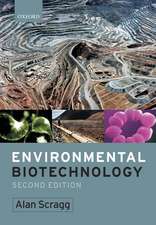Biotechnology for Fuels and Chemicals: Proceedings of the Eighteenth Symposium on Biotechnology for Fuels and Chemicals Held May 5–9, 1996, at Gatlinburg, Tennessee: ABAB Symposium, cartea 63-65
Editat de Brian H. Davison, Mark Finkelstein, Charles E. Wymanen Limba Engleză Paperback – 15 sep 2011
| Toate formatele și edițiile | Preț | Express |
|---|---|---|
| Paperback (1) | 984.13 lei 6-8 săpt. | |
| Humana Press Inc. – 15 sep 2011 | 984.13 lei 6-8 săpt. | |
| Hardback (1) | 992.33 lei 6-8 săpt. | |
| Humana Press Inc. – 2 mai 1997 | 992.33 lei 6-8 săpt. |
Preț: 984.13 lei
Preț vechi: 1200.16 lei
-18% Nou
Puncte Express: 1476
Preț estimativ în valută:
188.34€ • 194.56$ • 156.74£
188.34€ • 194.56$ • 156.74£
Carte tipărită la comandă
Livrare economică 25 martie-08 aprilie
Preluare comenzi: 021 569.72.76
Specificații
ISBN-13: 9781461274971
ISBN-10: 1461274974
Pagini: 916
Ilustrații: XIV, 898 p.
Dimensiuni: 178 x 254 x 48 mm
Greutate: 1.56 kg
Ediția:Softcover reprint of the original 1st ed. 1997
Editura: Humana Press Inc.
Colecția Humana
Seria ABAB Symposium
Locul publicării:Totowa, NJ, United States
ISBN-10: 1461274974
Pagini: 916
Ilustrații: XIV, 898 p.
Dimensiuni: 178 x 254 x 48 mm
Greutate: 1.56 kg
Ediția:Softcover reprint of the original 1st ed. 1997
Editura: Humana Press Inc.
Colecția Humana
Seria ABAB Symposium
Locul publicării:Totowa, NJ, United States
Public țintă
ResearchCuprins
Session 1—Thermal, Chemical, and Biological Processing.- Session 2—Biological Research.- Session 3—Bioprocessing Research.- Session 4—Industrial Needs for Commercialization.- Session 5—Emerging Topics in Industrial Biotechnology.- Session 6—Environmental Biotechnology.- Author Index.
Textul de pe ultima copertă
In Biotechnology for Fuels and Chemicals, based on the 18th Symposium, held in Oak Ridge, TN, May 5-9, 1996, leading researchers from academia, industry, and government present state-of-the-art research results and promising new concepts on the use of biotechnology to produce fuels and chemicals competitively. The contributions emphasize the utilization of renewable resources, but also include the bioconversion of fossil fuels and syngas, as well as the new area of conversions in nonaqueous environments.
The Eighteenth Symposium on Biotechnology for Fuels and Chemicals covers the development of new biological agents (such as enzymes or microbes) to carry out targeted conversions, in addition to actual bioprocess development. Topics range from improvements in enzymes to fundamental insights into substrate-enzyme interactions and photosynthesis, and from conversions of substrates using biological agents to combinations of chemical engineering, biological sciences, and fermentation technology. Agricultural crops, such as corn and corn fiber, as well as woody biomass and lignocellulosic wastes, are investigated for use in process feedstocks, including pretreatment studies. Also treated are a variety of potential bioconversion products, including fumaric acid, succinic acid, methane, enzymes, glucuronic acid, and biodiesel fuel.
The novel concepts, techniques, and research results reported in The Eighteenth Symposium on Biotechnology for Fuels and Chemicals are important contributions to the development of the new biological processes needed for the production of fuels and chemicals on a large scale, for the reduction of pollution, for solving waste disposal problems, and for helping remediate global climate change.
The Eighteenth Symposium on Biotechnology for Fuels and Chemicals covers the development of new biological agents (such as enzymes or microbes) to carry out targeted conversions, in addition to actual bioprocess development. Topics range from improvements in enzymes to fundamental insights into substrate-enzyme interactions and photosynthesis, and from conversions of substrates using biological agents to combinations of chemical engineering, biological sciences, and fermentation technology. Agricultural crops, such as corn and corn fiber, as well as woody biomass and lignocellulosic wastes, are investigated for use in process feedstocks, including pretreatment studies. Also treated are a variety of potential bioconversion products, including fumaric acid, succinic acid, methane, enzymes, glucuronic acid, and biodiesel fuel.
The novel concepts, techniques, and research results reported in The Eighteenth Symposium on Biotechnology for Fuels and Chemicals are important contributions to the development of the new biological processes needed for the production of fuels and chemicals on a large scale, for the reduction of pollution, for solving waste disposal problems, and for helping remediate global climate change.

































